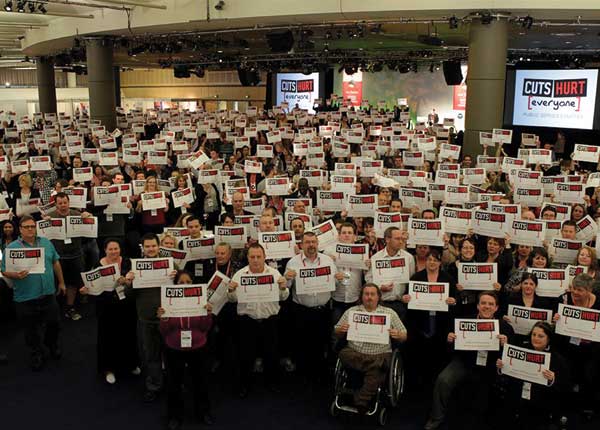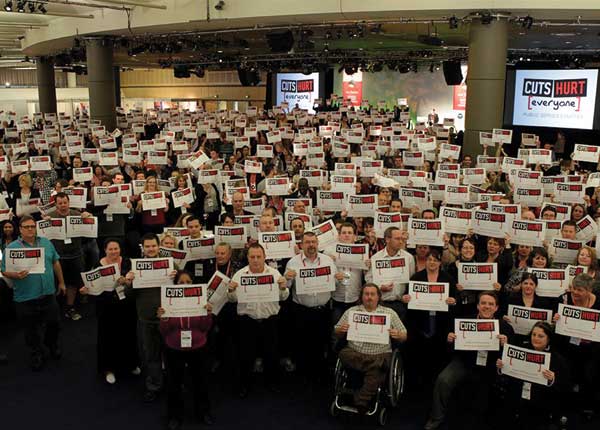
The Abbott government now looks set to face sustained industrial action from within its own bureaucracy in its first term.
The federal public service’s largest union, the Community and Public Sector Union (CPSU), on Thursday branded conditions contained in the latest enterprise bargaining framework as an outright attack on workplace rights and conditions, opening the door to a substantial escalation of hostilities over the renegotiation of the bureaucracy’s main industrial instrument.
The flagging of the protection of public service conditions and entitlements as the core issue in negotiations with the government by the CPSU is highly significant.
It is likely to shift the dispute to a legal arena where forcing key changes will be far more difficult for the government to prosecute unless it resorts to politically risky legislative change.
At the same time, the unfolding battle is scored by key business and employer groups as crucial reality check for the Abbott government’s intestinal fortitude for major industrial relations reform.
It is understood that a number of senior business leaders have actively encouraged the Abbott government to lead by example.
One executive told Government News the government should “eat their own dog food” in terms of industrial relations reform following comments that some big employers had made their lives more difficult by not standing up to unions.
So far, the CPSU is not being wagged and sticking to safe territory in terms of its rhetoric.
“Behind all the technical language of this complex bargaining framework there lies a very carefully crafted strategy to destroy jobs, conditions and rights,” CPSU National Secretary Nadine Flood said.
The union has also accused Minister for Employment, and the Public Service, Senator Eric Abetz of making a bid to narrow scope of claims “solely down to pay.”
The CPSU has asked for a 4 per cent pay rise over three years in its log of claims, a figure likely to be partially ambit given the Budget situation for the time being.
The government has countered that an increase would have to be met without additional funding or loss of service delivery – meaning that public service headcount would have to drop (and productivity necessarily increase) to produce the money.
In the event the union forgoes a pay rise, any moves to further cut the bureaucracy are certain to be characterised as being ideologically rather than financially.
The government has also made a bid to strip out any provision for backpayment of a pay increase to the date of the expiry of the existing enterprise agreement at the end of June 2014, a move clearly aimed at reducing any incentive for prolonged industrial action or protracted period of negotiation.
Senator Abetz has also moved to include new performance management measures in any new agreement that would make it easier to sanction or jettison underperforming staff.
While there is widespread acknowledgement – and often frustration among mid to senior level public sector managers and executives over how difficult it is to shift underperformers, there remains equal if not greater mistrust of performance sanctions being used to remove or punish bureaucrats for party political purposes – especially when ministers get into strife.
However pay could fast be becoming a subordinate issue in comparison to the flexible working hours and leave entitlements that make the public sector a desirable place to work for many.
“Minister Abetz is using pay as a convenient distraction from the fact that he is attacking job security, and workers’ rights and conditions – none of which he wants to talk about,” Ms Flood said.
As the date of the agreement’s expiry draws closer, Senator Abetz is becoming less taciturn.
“The CPSU says its log of claims is about job security, but its 12 per cent pay bid will potentially cost another 10,000 Public Service jobs on top of the 14,500 cuts inherited from Labor,” Senator Abetz said.
Senator Abetz accused the CPSU of “misrepresenting the bargaining framework, which is actually about responding appropriately to the diabolical financial mess left by Labor.”
“In light of this week’s comments on the current budgetary situation by the Treasurer and Treasury Secretary one would hope the CPSU would reconsider its approach,” he said.
Which comments from Treasury Secretary Martin Parkinson Senator Abetz meant is open for debate.
Having effectively cut short Dr Parkinson’s run in the public service’s top financial job on entering office, the Abbott government this week was on the receiving end of some frank advice from the man who no longer has a bureaucratic career to fear losing.
After giving a speech that threw a potential rise in the GST and wider tax reform into the mix as a realistic response to offset structural revenue problems, Dr Parkinson was conspicuously backed by Reserve Bank Governor Glenn Stevens who said there needed to be a debate on taxation.
The practical challenges of public administration were then underscored after Dr Parkinson’s term was, with grudging humility and lack of fanfare, extended for another six months.
If the discussion pf higher order policy issues didn’t go as planned this week for the government, the smaller ones are not about to get any easier thanks to the CPSU when 70 of its Governing Council war-room their response to the government over on Thursday and Friday.
Ahead of a more formal response, the CPSU has set out the following sticking points over the government’s negotiating framework:
• Conditions: Under the new policy agencies will be forced to cut employees’ conditions and entitlements to offset any pay rise. Suggested measures include reducing leave entitlements, use of leave, forcing work onto lower level employees and cutting managerial staff. Agencies will also be barred from enhancing conditions.
• Jobs: The policy makes no provision regarding jobs or job security and seeks to drive down the classification level at which work is being conducted.
• Pay: The new policy does not include any pay offer and severely restricts pay outcomes. It ties any improvements in pay directly to employee-related savings, pushing agencies to cut employment conditions. It also severely limits the range of productivity improvements that can be considered in setting pay increases.
• Rights: The new policy seeks to ‘streamline’ or strip rights out of agreements and limit the range of content that can be included which means employees would have less enforceable rights on issues such as dispute resolution, consultation and health and safety.
• Genuine negotiations: The new policy is far more complicated than the one it replaces, with the Government seeking to tightly control bargaining outcomes through new and onerous restrictions on what agencies can negotiate.
Having acquainted himself with the union’s immediate worries, Senator Abetz had a polite and unambiguously firm message for its leaders and members.
“The CPSU Governing Council is meeting in Canberra this week. I would invite them to review the CPSU’s approach to these issues and to the Government.”
Game on.
Comment below to have your say on this story.
If you have a news story or tip-off, get in touch at editorial@governmentnews.com.au.
Sign up to the Government News newsletter
One thought on “APS industrial action looms over Abbott’s first term”
Leave a comment:
Most read
Scathing report finds little has changed at PwC
Qld council welcomes progress on massive battery system
‘Local’ procurement turns out not to be so local, committee hears
Another report finds local government falling down on cyber security
MoG changes see regions, investment return to NSW Premier’s Department


I consider this article a bit political in tone.